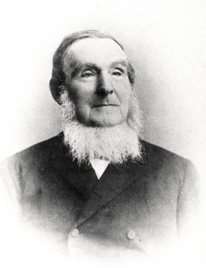Ferdinand Wüstenfeld
Heinrich Ferdinand Wüstenfeld (31 July 1808 – 8 February 1899) was a German orientalist, known as a literary historian of Arabic literature, born at Münden, Hanover.

Heinrich Ferdinand Wüstenfeld
He studied theology and oriental languages at Göttingen and Berlin. He taught at Göttingen, becoming a professor there (1842–90).[1] He published many important Arabic texts and valuable works on Arabic history.
Writings and translations
- Navavi, Liber concinnitatis nominum (1832)
- Dahabi, liber classium virorum qui karani et traditionum cognitione excellerunt (1833–34)
- Abulfeda, Tabulse quoedam geographica? (1835)
- Ibn Challikan, Vitae illustrium virorum (1835–50)
- Geschichte der Arabischen Ärzte und Naturforscher (1840)
- Navavi, Tahdhib al-Asma, Biographical dictionary of illustrious men (4 bd, 1842–47)
- Makrizi, Geschichte der Kopten (1846)
- Zakariya al-Qazwini, ‘Aja'ib al-makhluqat, Zakarija Ben Muhammed Ben Mahmud el-Cazwini's Kosmographie (2 vols, 1849)
- Ibn Coteiba, Handbuch der Geschichte (1850)
- Genealogische Tabellen der arabischen Stämme und Familien (1852)
- Register zu den genealogischen Tabellen der arabischen Stämme und Familien (1853)
- Ibn Dorejd, Kitab ul-Ishtiqaq, Genealogisch-etymologisches Handbuch (2 bd, 1854)
- Vergleichungstabellen der mohammedanischen und christlichen Zeitrechnung (1854)
- Ibn Hischam, Das Leben Mohammeds (4 bd. 1857-60)
- Das Leben Muhammed's nach Muhammed Ibn Ishâk; (1858), Volume: v.01 pt.01
- Das Leben Muhammed's nach Muhammed Ibn Ishâk; (1859), Volume: v.01 pt.02
- Das Leben Muhammed's nach Muhammed Ibn Ishâk; (1860), Volume: 02
- Geschichte der Stadt Medina (1860)
- Chroniken der Stadt Mekka (4 bd, 1857–61)
- Jakut, Geographisches Wörterbuch (6 bd, 1866–73)
- Bahrein und Jemàma. Nach Arabischen Geographen beschrieben (1874)
- Die Statthalter von Agypten (1876)
- Qalqashandī, Aḥmad ibn ʻAlī (1879). Die Geographie und Verwaltung von Ägypten. Translated by Ferdinand Wüstenfeld.
- Das Heerwesen der Muhammedaner (1880)
- Geschichte der Fatimiden-Chalifen. Nach arabischen Quellen (1881) reprinted 1976
- Die Geschichtschreiber der Araber und ihre Werke. (1882)
- Die Çufiten in Süd-Arabien im XI. (XVII.) Jahrhundert (1882) (1883)
- Der Imam el-Schäfii und seine Anhänger (1889–91)
gollark: [DATA EXPUNGED]
gollark: The PotatOS Development Foundation forbade me from sharing it.
gollark: Throwing things at lightspeed is illegal.
gollark: I was actually banned from doing maths after an incident when I proved that 19247 didn't exist.
gollark: I see. Seems accursed.
References
- "Bahrain and Jemama". World Digital Library. 2011-10-17. Retrieved 2014-06-22.
- This article incorporates text from a publication now in the public domain: Gilman, D. C.; Peck, H. T.; Colby, F. M., eds. (1905). New International Encyclopedia (1st ed.). New York: Dodd, Mead. Missing or empty
|title=(help)
This article is issued from Wikipedia. The text is licensed under Creative Commons - Attribution - Sharealike. Additional terms may apply for the media files.